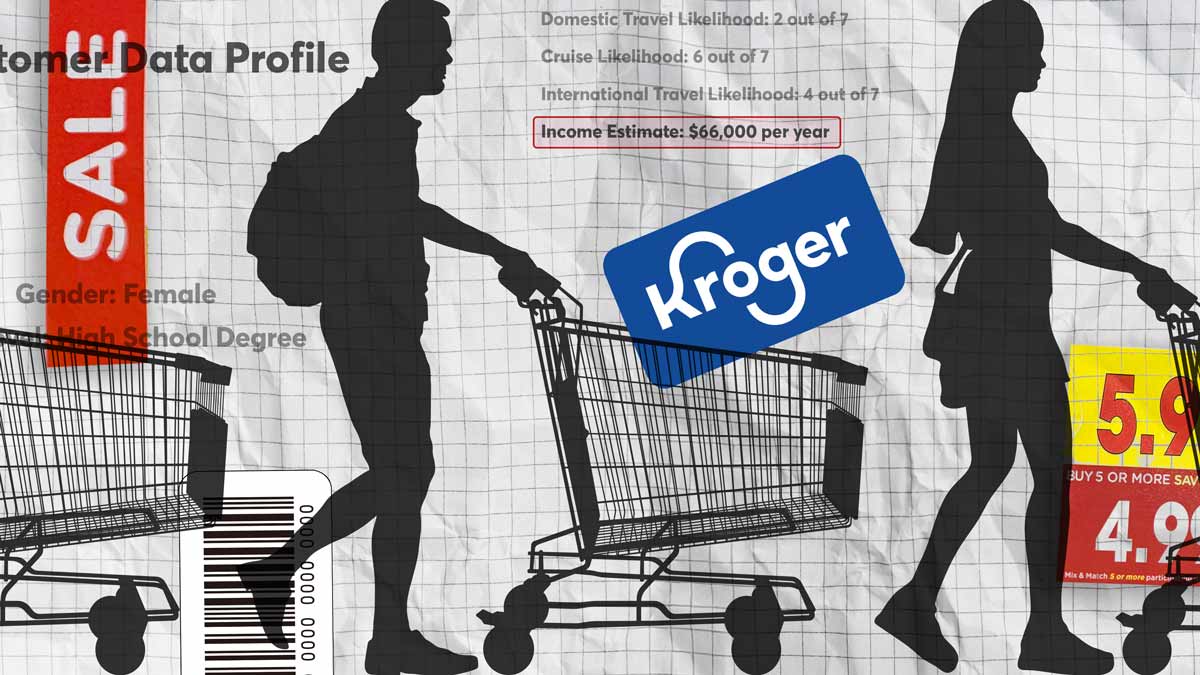Personalized discounts can exacerbate existing wealth inequalities, experts say.
“The way this data is being used is very clearly widening the gap between upper, middle, and low-income households, and unless regulators take action, it will only get worse,” says David Friedman, a professor and dean at Willamette University in Oregon and a nationally recognized expert in consumer trade practices law.
Kroger, one of the nation’s largest grocery chains and one of the most advanced when it comes to tracking shoppers’ purchases and behavior through analytics, keeps reams of data about its roughly 63 million customers. For years, Kroger has made a concerted effort to drive people to its loyalty program and more than 95 percent of customer transactions are tied to a Kroger loyalty card.
The grocery chain also has an in-house data unit—called 84.51°, which refers to the longitude and latitude coordinates of its Cincinnati headquarters—that is tasked with collecting and analyzing shopper data to create personalized discounts, including those for its “private label” Kroger-brand products and grocery items sold by major food brands, such as Conagra Brands, the company behind Chef Boyardee, Orville Redenbacher’s, Hebrew National, and Slim Jim.
But increasingly, Kroger has another lucrative side business: Its privacy policy makes it clear that it can take the data on shoppers like Salem, repackage it, and sell it to other companies that use it for marketing and advertisements. In an investor call in 2021, a Kroger executive underscored the value of such shopping data. “The result is a longitudinal view of purchase behavior, anchored in 10 petabytes of consumer behavior data, which is extremely valuable to CPG [consumer-packaged goods] brands and sets the foundation for media activation opportunities,” she said.
Kroger’s “precision marketing” division made an estimated $450 million in profit in 2023, $527 million in 2024, and could see profits of $825 million in 2027, according to Guggenheim Securities, an investment banking company. (Kroger doesn’t publicly release division-by-division profits.) The growth of what Kroger calls its “alternative profit” business, which includes its marketing unit, has helped the grocer, despite low margins in its actual grocery stores, report record earnings, including $3.85 billion in operating profit last fiscal year.
Kroger’s “alternative profit” business now represents more than 35 percent of the company’s net income.
As a result, Salem’s report may have been sent to more than 50 different U.S. companies, Kroger acknowledged to him in writing. They include two tobacco companies, one of the country’s largest data brokers, financial institutions, and a host of analytics and marketing firms that could result in unwanted solicitations and spam.
And there are other companies that Kroger customers could object to having their data sold to, such as Soda Health, a healthcare tech company that works with health insurers, and Solutran, a fintech payments platform that helps process Electronic Benefits Transfer, or EBT, benefits for the federal government’s Supplemental Nutrition Assistance Program (SNAP). This is particularly concerning for some shoppers because Kroger’s privacy policy states, “Where permitted by applicable law, to serve you better we may make certain inferences about you based upon your shopping history that are health related.”
In a statement, Kroger says it discloses shopping “basket data” to Soda Health and Solutran to “validate product eligibility to enable customers to purchase these products with the benefit cards” those companies administer. Kroger says it also sells “limited point of sale data” to the Altria Group and Reynolds, two of the nation’s major tobacco companies, for unspecified “merchandising discounts.”
In 2023, The Markup, a news site focused on technology, found marketing brochures and websites for Kroger’s in-house data unit, 84.51°, that highlighted the company’s extensive use of customer data, including demographic info. That report uncovered a marketing website that referenced an ethnic panel of Hispanic shoppers and another page that claimed Kroger had data on 2 billion annual transactions “across 60 million households with a persistent household identifier”—a unique ID that can be traced back to an individual consumer.
That 84.51° website has since been updated to remove the reference to “60 million households” but still says it has a “persistent household identifier” for its customers.
Source link
